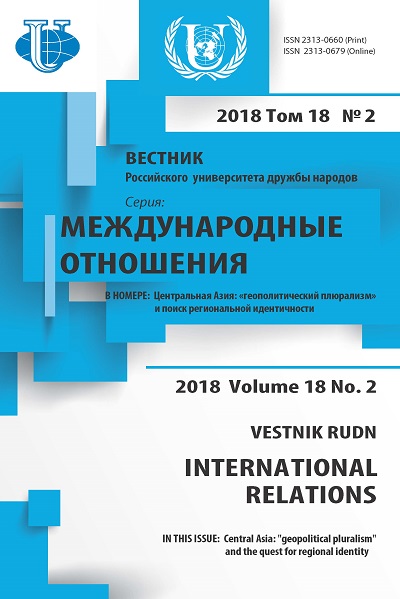ENERGY DIALOGUE BETWEEN RUSSIA AND SAUDI ARABIA IN 2010-2017
- Authors: Ahmed M.A.1
-
Affiliations:
- RUDN University (Peoples’ Friendship University of Russia)
- Issue: Vol 18, No 2 (2018): Central Asia: “geopolitical pluralism” and the quest for regional identity
- Pages: 342-355
- Section: INTERNATIONAL ECONOMIC RELATIONS
- URL: https://journals.rudn.ru/international-relations/article/view/18885
- DOI: https://doi.org/10.22363/2313-0660-2018-18-2-342-355
Cite item
Full Text
Abstract
Energy dialogue between Russia and the Kingdom of Saudi Arabia became an issue of current importance in many respects, due to transformation of the whole system of international relations in the Middle East, caused by several military and political crises as well as the new political and military role assumed by Russia in Syrian crisis settlement. The energy dialogue between the two oil-producing countries is considered as one of the key mechanisms promoting crises settlement in the Middle East, regulating disputable issues in energy pricing and as adjusting infrastructure, social and environmental problems in the region. The author’s position is that international relations are not a “zero-sum game”. So, the political will of states to find the compromises contributes to the stabilization of the situation in the Middle East that, in its turn, can provide sustainable social and economic development of Russia and Saudi Arabia. The aim of this article is to identify the features of the energy dialogue between Russia and KSA and to determine the factors affecting it. The author uses methods of the comparative analysis and system approach. This paper analyses the conceptual basis of energy policy of the Russian Federation and Saudi Arabia, international treaties and the functioning of the “OPEC+” format, compare the approaches of Russia and KSA to the formation of the dialogue in the energy sector. The opinions of leading Arab and Russian experts in the energy field are taken into consideration. As a result, the following key features of the energy dialogue between Russia and the KSA were marked out. Firstly, in many aspects it is determined by regional political and military crises and fundamental difference in Russia’s and the KSA’s approaches to the final settlement of the Syrian conflict. Secondly, by introducing the concept of “the alliances overturn” the author draws attention to important changes in the way KSA forms partnership with the USA and Russia. In the context of conceptual changes in KSA’s approach to the strategic partnership with the USA and Russia. Thirdly, the author emphasizes the willingness of the parties to make mutual concessions in matters of principle, such as the conflict in Yemen and Syria. The fourth key feature of the dialogue between Russia and the KSA is using energy as a universal platform to find mutually beneficial solutions in ensuring regional economic security and military and political stability.
About the authors
Mohamed Abdu Hassan Ahmed
RUDN University (Peoples’ Friendship University of Russia)
Author for correspondence.
Email: mido_pharon@mail.ru
postgraduate student of the Department of Theory and History of International Relations of Peoples’ Friendship University of Russia (RUDN University)
References
- Arafa, Khadija (2014). Energy security and its strategic implications. Riyadh: Naif University for Security Studies. (In Arab.).
- Bronson, R. (2006). Thicker than Oil: America's Uneasy Partnership with Saudi Arabia. New York: Oxford University Press.
- El Hadji, A.F. (n/a). Oil between KSA, RF and Iran. URL: https://www.anasalhajji.com/about-dranas-alhajji (accessed: 15.10.2017). (In Arab.).
- Hadjer, М. (2016). Energy Security: Relations between Russia and Europe (2000—2015). URL: http://democraticac.de/?p=34018 (accessed: 15.10.2017). (In Arab.).
- Ilminskaya, M. F. (2015). The Persian Gulf Region as a Field of China’s Geopolitical Interests. Vestnik RUDN. International Relations, (1), 152—161. (In Russ.).
- Jones, T.C. (2010). Desert Kingdom: How Oil and Water Forged Modern Saudi Arabia. Cambridge, MA: Harvard University Press.
- Kazdagli, N. (2017). Relation between Russia and the countries of North Africa. The Russian-Arab Business Council // Vestnik Voronezh State University, 1, 58—62. (In Russ.).
- Lebedeva, M.M. (2016). System of political organization of the world: ‘Perfect Storm’. Vestnik MGIMO-University, 2 (47), 125—133. (In Russ.).
- Manukov, S. (2015). The Monarchies of the Persian Gulf preparing response to Russian activity in Syria. Expert Online. URL: http://expert.ru/2015/10/5/monarhii-persidskogo-zaliva-gotovyatotvet-na-dejstviya-rossii-v-sirii/ (accessed: 17.11.2017). (In Russ.).
- Oil opens a new page in relations between Russia and Saudi Arabia. Orient Research Center Dubai. URL: http://www.orientresearchcentre.com/ﺕﺎﻗﻼﻌﻟﺍ-ﺔﻳﺩﻮﻌﺴﻟﺍ-ﺔﻴﺳﻭﺮﻟﺍ-ﻂﻔﻨﻟﺍ-ﺢﺘﻔﻳ/ (accessed: 10.11.2017). (In Arab.).
- Primakov, E.M. (2012). Confidential: The Middle East on stage and behind the scene. Moscow: Rossiyskaya Gazeta. (In Russ.).
- Saudi Arabia — Russian Federation: disagreements in the relationship. Center for Political and Strategic Studies 'Rawabet'. URL: http://rawabetcenter.com/archives/22155/amp (accessed: 15.10.17). (In Arab.).
- Savicheva, E.M. (2014). On Geopolitical Situation in the Middle East: Interaction between Regional and Global Trends. Vestnik RUDN. International Relations, (3), 14—21.
- Savicheva, E.M. & Shaar, M.O. (2014). Relations of the Arab Gulf countries with Central Asian states of CIS. Vestnik RUDN. International Relations, (4), 160—168. (In Russ.).
- Shehata, M.M. Russia's foreign policy towards Saudi Arabia after 2011. Democratic Arab Center for strategic, political and economic studies. URL: http://democraticac.de/?p=48025 (In Arab.). (accessed: 16.10.2017).
- Young, M. (2017). What Did King Salman’s Visit to Russia Say about U.S.-Saudi Relations? URL: http://carnegie-mec.org/diwan/73334 (accessed: 16.10.2017).
- Zhiznin, S. (2005). Energy Diplomacy of Russia: economics, politics, practice. Moscow: Ist Bruk. (In Russ.).
- Zhukova, I.S. (2010). Energy diplomacy and geopolitics, as part of international energy law. Vestnik of Orenburg State University, 3 (109), 52—54. (In Russ.).











